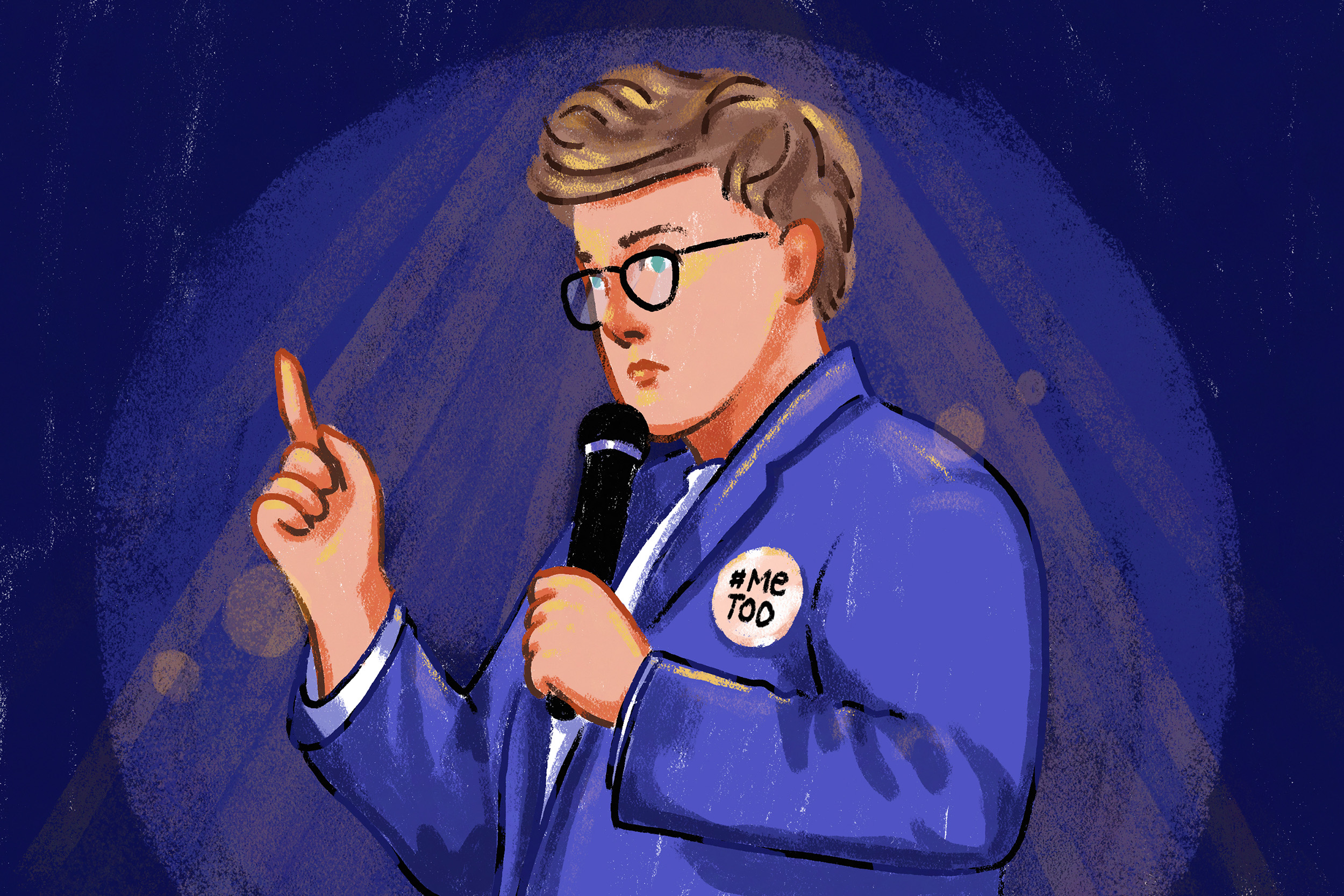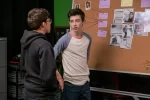CW: Abuse
Hannah Gadsby’s Netflix comedy special, “Nanette,” can be described as an hour and nine-minute venting session fueled by female rage. Gadsby recounts the continuous acts of violence she has gone through throughout her life. Released in 2018, this special struck a nerve with those who felt as if they were at the receiving end of Gadsby’s wrath. “Nanette” was praised as a #MeToo-era comedy game-changer. Gadsby does a beautiful job of attempting to take care of others, and their own stories. There is a synergistic relationship between humor and activism itself within this special. When looking at “Nanette” through the lens of the #MeToo movement it becomes evidently clear that the conversations that need to be had are coming to the surface.
Gadsby starts an era of comedy that was bound to happen, holding these conversations that unfortunately have to be said no matter how painful it becomes. One point during the special Gadsby confesses her fear of being alone in a room full of strangers, especially if they are all men.
“I am not a man hater,” she says. “But I am afraid of men.”
In the beginning of the special, Gadsby silences herself by letting her audience in on a story in which she does not give the full details, but at the end of the show rather than her walking away, she decided to share the actual truth with the audience. The truth that she was targeted and abused one night. Gadbsy has the strength to share this story, but also share her thoughts that she had after this traumatic experience. “He beat the shit out of me and nobody stopped him. I didn’t report him to the police. And I didn’t take myself to hospital. And I should have. But I didn’t, because that’s all I thought I was worth. That’s what happens when you soak one child in shame and give permission to another to hate.” The reason behind Gadsby keeping those dark details out of the joke that is said in the beginning of the show is due to the fact that she believes that as long as we avoid telling the parts of our stories that are painful to us, then we avoid the chance of people using that against us, or in comedic terms as a punchline. It’s to this end that she announces she’s done with stand-up comedy because self-deprecating jokes have become too much.
She signals the accountability men lack in terms of awareness, the idea that women are afraid of men due to actions that others have caused. When looking through the lens of movement, these difficult conversations that Gadsby is having with her audience creates a space where women can share their stories, but also creates a space where people must actually stop and listen.
“I don’t hate men, but I wonder how a man would feel if they would have lived my life.”
After watching the segment, viewers who have been listening tend to leave with something powerful and meaningful because of her honest words. “Nanette” was performed by Gadsby in Australia and also in the U.K. Although this was before the general public was fully aware of the #MeToo movement, the themes and issues of systemic abuse and the reactions to these instances was something that has always haunted comedian Hannah Gadsby. The confusion is: why are people opposed to calling out those who have been the abusers? People continue to support these abusers and claim them to be geniuses for their work, rather than their inappropriate actions. Gadsby’s bitterness towards the world and the men who take part in this abuse was a sign to herself that she had not healed the trauma of her abuse. Gadsby felt that if she did not address the situation at hand then she would have to quit comedy entirely.
“Nanette” has become a staple artifact to the #MeToo Movement. Gadsby’s soul-baring special highlights the culture of storytelling, especially as a woman, and establishes what the safety within that means in this post #MeToo world. While looking at “Nanette” through the lens of #MeToo, it is clear that Gadbsy left her audience to reflect on their own stories and the ones they are being told. By sharing her story of abuse with her audience, and the raw and intimate details she provides, she leaves her audience with something more than a good joke; she leaves them with the opportunity to reflect and learn. This act alone helps create ways in which these continuous cycles of abuse against women can end, while also creating a community for her audience where they can feel heard.
Since 2017, when the #MeToo movement began gaining momentum, we have witnessed culture change due to the severity of this event alone. The way audiences perceive comedy has changed due to the transformed delivery in which jokes with underlying meaning are being told. Hannah Gadsby uses serious tones within her strategically placed stories to highlight that this type of abuse is not to be taken lightly. Thus, “Nanette” can be recognized as an important artifact towards the #MeToo movement. They both represent an act of activism against protesting against the violence against women, along with creating a community where women can be listened to, rather than silenced.
“Do you know who used to be an easy punchline? Monica Lewinsky. Maybe, if comedians had done their job properly, and made fun of the man who abused his power, then perhaps we might have had a middle-aged woman with an appropriate amount of experience in the White House, instead of, as we do, a man who openly admitted to sexually assaulting vulnerable young women because he could,” (Nanette). This statement isn’t quite to make the audience laugh, rather it is to make them think and reflect. This is a prime example of Gadsby using charged humor to further prompt her audience to think on their own actions, along with how they may be contributing to the cycle of abuse that forces women into silence and hiding. If comedians had listened to Monica Lewinsky along with any other woman who is a victim of abuse, rather than making them the brunt end of the joke in their sketches there would have been an early opportunity to break these cycles of abuse, and offensive jokes. Comedians would isolate these women in their jokes which have underlying themes of abuse and sexual misconduct, because it was easy. Rather than these comedians coming up with actual jokes with real punchlines, they are punching down against these women who have experienced public humiliation after being vulnerable with their story.
There is vulnerability within these jokes by many comedians. Gadsby has been experimenting with this new form of comedy where she does not try to build an area of comfort for her audience– if they are uncomfortable, she wants them to sit with that and reflect.
As American Studies scholar Rebecca Krefting rightly puts it: “For Gadsby, comedy as a performance practice has problems. It encourages self-deprecation, which she insists doubles as ‘humiliation.’ It also forces comics to generate humorous resolutions to any tension created, which can function to diminish the serious nature of social critique.”
“Nanette” is a perfect example to prove how the #MeToo movement changed the landscape of comedy as a whole. The space that Gadsby creates during her shows, along with her brutal honesty and reflection, is something that was never done before in comedy.
There are different types of humor that a comedian may integrate into their sketches and work. A new modern style of humor is charged humor, and the reasoning behind the name is very fitting.
Author and comedian expert Rebecca Krefting defines it as “a metaphor for the reaction of the audience and their response to this specific kind of humor. Charged humor is self-examination, which presents the viewers with real and usual personal examples of feeling like one is a member of society in which they are contributing to social inequities, but also offers solutions and balance for finding strategies to fix this inequality.”
Charged humor enables one’s social consciousness, along with one’s political consciousness to address inequality issues. Comedians will try to seek opportunities during their sketches to bring new world views to their audience members. By creating discourse and public consciousness, one is using charged humor. The humor here is intentional, and therefore, there is a wanted outcome from the comedy in question.
Charged humor asks viewers to think critically. It also becomes more prominent when an audience or even country is divided. Some people may agree with the material being said in the joke, meanwhile others might have different opinions. A comedian must know their audience, and the demographics of that audience as well. Charged humor can be directly divisive, and reactions can come from this, both negative and positive. It would not be surprising if some members of the audience feel as if they are being targeted by the comedian, when the reasoning behind that feeling could be from their own conscience. Members of the audience may even demonstrate actions from a place of self reflection.
When a comedian makes the cognitive decision to create a community within their audience or a solution for a community, it is known to be called an act of cultural citizenship. It is important to build your audience up, and use it with a combination of charged humor. With the use of satire and mockery, a comedian will take a stance on a public issue and assert that their audience feels seen on these topics.
Hannah Gadsby uses humor as an engagement with her audience. She does her job as a comedian and tries to build a connection with her audience. This is a specific strategy to make her audience feel comfortable in a space where they can share their stories, if that was needed. If the reaction of the audience is what was intended, then the comedian has done their job of making that connection through satire and humor.
“Hannah Gadsby: Nanette” is available to stream now on Netflix.

















